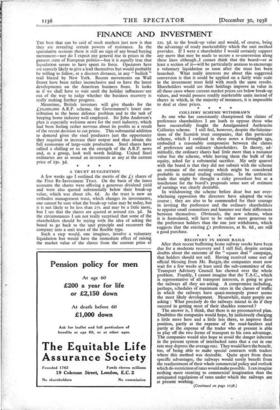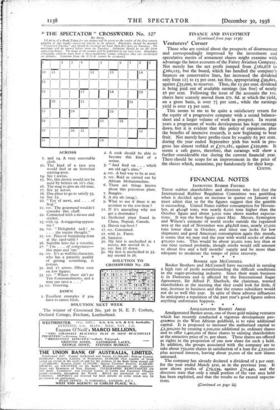FINANCE AND INVESTMENT THE best that can be said of
stock markets just now is that they are revealing certain powers of resistance. In the speculative sections _there is still no sign of any broad buying movement—nor do I expect any general rise in prices in the present state of European politics—but it is equally true that liquidation seems to have spent its force. Operators here are scarcely likely to give a lead themselves but would probably be willing- to follow, at a discreet distance, in any " bullish " trail blazed by New Yotk. Recent movements on Wall Street have been rather inconclusive and so have the latest developments on the American business front. It looks as if we shall have to Wait until the holiday influences • are out of the way to judge whether the business recovery is really making further progress.
Meantime, British investors will give thanks for the £20,000,000 A.R.P. scheme, the Government's latest con- tribution to the home defence problem and to the task of keeping home industry well employed. Sir John Anderson's plan is especially welcome news for the steel industry, which had been feeling rather nervous about its profits as a result of the recent decision to Cut prices. _ This substantial addition to demand gives the steel .producers just the opportunity they required to increase their output and thus obtain the full economies rof large-scale production. Steel shares have rallied a shilling or so -on the strength of the A.R.P. news and, as a group, look well worth holding. • United Steel ordinaries are as sound an investment as any at the current price of 23s. 3d. * * * *
A TRUST SUGGESTION
A few weeks ago I outlined the merits of the £r shares of the First Re-Investment Trust. On the basis of the latest accounts the shares were offering a generous dividend yield and were also quoted substantially below their break-up value, which was about 28s. 6d. As the trust is now an orthodox management trust, which changes its investments, one cannot be sure what the break-up value may be today, but it is not likely to be less than 27s. and may be a little more, but I see that the shares are quoted at around 22S. 3d. In the circumstances I am not really surprised that some of ffie shareholders should be toying with the idea of asking the board to go back to the unit principle and reconvert the company into a unit trust of the flexible type.
Such a step would, one imagines, involve a voluntary liquidation but would have the immediate effect of raising the market value of the shares from the current price of 225. 3d. to the break-up value and would, of-course, bring the advantage of ready marketability which the unit method provides. If I were a shareholder I would certainly support any move that may be made to secure a re-conversion along these lines although b1 cannot think that the board—or at least a section of it—will be particularly anxious to.encourage a Voluntary liquidation so soon after the trust has been launched. What really interests me about this suggested conversion is that it could be applied on a fairly wide scale in the investment trust field with much the same results. Shareholders would see their holdings improve in value in all those cases where current market prices are below break-up values, and would possess readily marketable units instead of shares in which, in the majority of instances, it is impossible to deal at close prices. * * * *
COLLIERY SCHEME WITHDRAWN
• As one who has consistently championed the claims of preference shareholders I am loath to oppose those who have successfully fought the Amalgamated Anthracite Collieries scheme. I still feel, however, despite the fulmina-- tions of the Scottish trust companies, that this particular. scheme, which I outlined in these notes a fortnight ago, embodied a reasonable compromise between the claims of preference and ordinary shareholders. In theory, ad-' mittedly, the ordinary shares had little more than a nuisance value but the scheme, while leaving them the bulk of the equity, asked for a substantial sacrifice. My only quarrel with the board is that they did not submit with the scheme an estimate of the earnings which might be considered probable in normal trading conditions. In the anthracite trade that might be thought a risky procedure but as a touchstone for the board's proposals some sort of estimate of earnings was clearly desirable.
In withdrawing the scheme before dour but not over- whelming opposition the directors have adopted the wise' course ; they are also to be commended for their courage in inviting the preference and the ordinary shareholders to appoint small committees and hammer out their differences between themselves. Obviously, the new scheme, when it is formulated, will have to be rather more generous to the preference holders than the one just withdrawn, which suggests that the existing Li iireferences, at 8s. 6d., are still a good purchase. * * * * • S.
RECOVERY IN HOME RAILS
After their recent buffetting home railway stocks have been due for a moderate recovery and I still feel, despite certain doubts about the outcome of the "square deal" campaign, that holders should not sell. Having received some sort of official blessing from Mr. Burgin, the companies must now wait for a few weeks at least until the sub-committee of the Transport Advisory Council has chewed over the whole problem. Frankly, I cannot imagine that the T.A.C., which is representative of all transport interests, is going to give the railways all they are asking. A compromise including, perhaps, schedules of maximum rates in the classes of traffic in which the railways have quasi-monopoly power seems the most likely development. Meanwhile, many people are asking : What precisely do the railways intend to do if they succeed in getting most of their shackles removed ?
The answer is, I think, that there is no preconceived plan. Doubtless the Companies would hope, by judiciously charging a little more here and a little less there, to improve their position, partly at the expense of the road-hauliers and partly at the expense of the trader who- at present is able to play off the two forms of transport to his own advantage. The companies would also hope to avoid the danger inherent in the present system of interlocked rates that a cut in one rate may depress-the average rate. They would have the benefit; too, of being able to make special contracts with traders where this method was desirable. Quite apart from these specific advantages, the railways would surely benefit from the readjustment of their whole commercial policy and outlook which de-restriction of rates would make possible. I can imagine nothing more stunting to commercial imagination than the antiquated regulations of rates under which the railways are at present working:
(Continued on page 1138.)
FINANCE AND INVESTMENT
(Continued from page 1136)
Venturers' Corner
Those who are cynical about the prospects of disarmament and correspondingly impressed by the investment and speculative merits of armament shares might examine with advantage the latest accounts of the Fairey Aviation Company. Not merely has the net profit jumped from £162,678 to 4260,125, but the board, which has handled the company's finances on conservative lines, has increased the dividend only from 121 to 15 per cent. tax free, appropriating £99,6o1, against £35,000, to reserves. Thus, the i5 per cent. dividend is being paid out of available earnings (tax free) of nearly 26 per cent. Following the issue of the accounts the tos. shares have scarcely moved from 27s. 6d. at which the yield, on a gross basis, is over 71 per cent., while the earnings yield is over 13 per cent.
This seems to me to be quite a satisfactory return for the equity of a progressive company with a sound balance- sheet and a larger volume of work in prospect. In recent years a programme of works development has kept earnings down, but it is evident that this policy of expansion, plus the benefits of intensive research, is now beginning to bear fruit. Not merely have profits risen by roughly 65 per cent. during the year ended September 30th but work in pro- gress has almost trebled at £571,181, against £220,000. It Seems a safe guess, therefore, that earnings will show a further considerable rise during the current financial year. There should be scope for an improvement in the price of the shares which, meantime, pay handsomely for their keep.
CUSTOS.



































 Previous page
Previous page